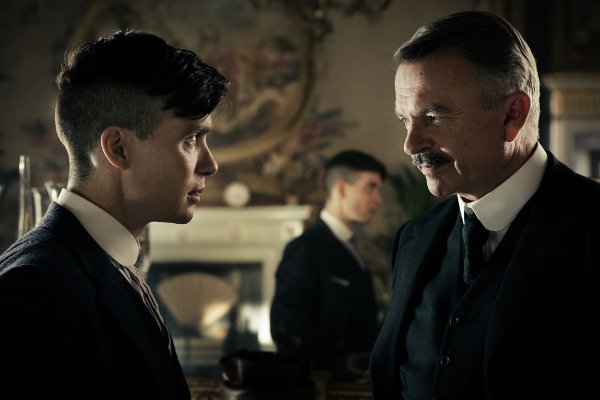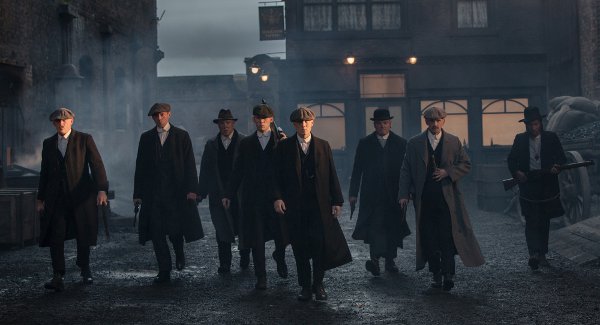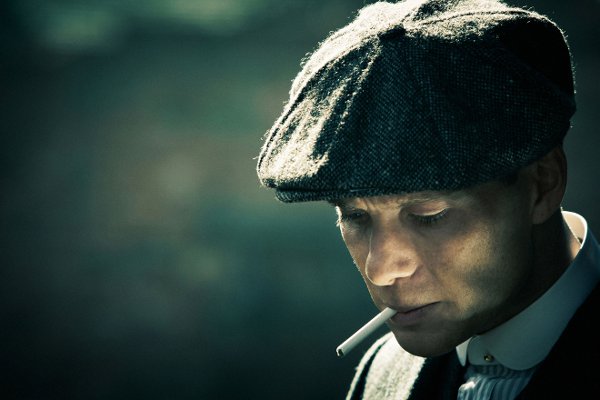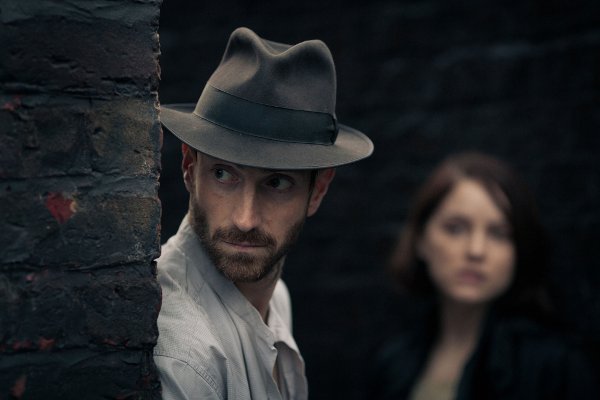Peaky Blinders
BBC Two
★★★★★ (out of five)
Thursdays, 9pm
“THIS is England, not Belfast - bodies thrown in the river here wash up in the papers,” warns the young Winston Churchill in the pitch-black BBC TV serial Peaky Blinders.
Set in the period following World War One, Peaky Blinders is a crime drama with strong but subtle tones of political and social comment and it’s likely to be a jewel in the autumn schedules.
Multi-textured, baring broad narrative references to the Bible and Blake, and from the Western and gangster genres, Peaky Blinders stars Cillian Murphy in a fresh, eye-catching role.
Against the backdrop of industrial Birmingham, with its mud-caked streets, poor sanitation and dark, satanic mills, Murphy exchanges his usual glamorous persona for a cropped haircut beneath a flat cap, even convincingly adopting that most unglamorous of characteristic traits – a Brummie accent.
 Cillian Murphy and Sam Neil
Cillian Murphy and Sam NeilMurphy plays Tommy Shelby, leader of the eponymous criminal gang the Peaky Blinders, who get their name because they stitch razor blades into their caps for use when the aggro starts.
There’s many a scarred cheek and slashed eye-ball. Like a family firm, the gang includes the whole Shelby clan, with the matriarchal Aunt Polly (excellent Helen McCrory) imposing her hard-won wisdom against Tommy’s more daring strategies. "You have your mother’s sense and your father’s devilment," she warns him, "I can see them fighting inside you."
No ordinary thug-like outfit, Peaky Blinders dominate local life through a mix of ruthless violence, canny largesse and superstitious deceit.
In an exquisitely imaginative opening, Tommy rides a black racehorse (Monaghan Boy) through the dank backstreets and performs the “Chinese powder trick” for an enthralled crowd. It’s part of a scam to fix the betting at Cheltenham but it’s portrayed with gripping conviction.

Yet Tommy’s horse-racing villainy is just one strand in an intricate plot. The really meaty MacGuffin (Hitchcock’s phrase) involves a crate of military guns, which fortuitously falls into Tommy’s possession and which the authorities desperately want returned before they pass into dangerous hands, post-war Britain being a ferment of IRA agitation and Marxist sedition.
Hence, Peaky Blinders sees the return to our screens of Tyrone-born Sam Neil, an actor who can effortlessly suggest in the characters he plays a barely tethered brutality beneath an outer veneer of civility.
When Neil played the struggling Victorian gentleman in Jane Campion’s The Piano (1993), he took an axe to Holly Hunter’s index finger and he first became prominent as the Devil himself in The Final Conflict (1981), disguised behind the mask of respectable businessman Damien Thorn.
Here he is less diabolical demon and more avenging angel, playing Chief Inspector Campbell who arrives from Ulster to retrieve the missing weaponry and carries with him an apocalyptic zeal.
In a richly cinematic sequence Campbell arrives in town at night-time, surveying the swill of crookery, drunkenness and debauchery to his left and right.
By his facial expression alone he appears like a cross between Wyatt Earp coming to clean up Tombstone and the Grim Reaper looking down on Sodom and Gomorrah.

When Campbell addresses his fellow officers he lambasts them for allowing “beggars and thieves” to pollute the locality. Policemen turn a blind eye, the chief charges, as criminals, communists and Fenians ’feed off the pus of corruption, like maggots in a corpse,’ and he solemnly avows his intention to decapitate this “three-headed beast”.Someone’s been cribbing off the Old Testament.
Still, for all his puritanical rhetoric, Campbell is menaced by the shadow of his own guilty conscience. Within his operation he has engaged the talents of the beautiful Grace (Annabelle Welles), a mysterious Galway colleen who’s serving bar while spying on Tommy in the local boozer.
Campbell has her working undercover but there’s enough to suggest he’d really like her under the covers, a mortal failing for which no man on Earth would condemn him, but for which a wrathful God in Heaven just might.
There’s an imaginative weave across the narrative that pitches all the characters not merely up against their foes but up against themselves. All keep a dangerous secret.
Tommy’s boyhood pal and wartime comrade Freddie (Iddo Goldberg) is a Trade Unionist, who is uncowed by tough reputations: “I’m not afraid of Tommy Shelby,” he insists. Freddie is furtively courting Tommy’s sister Ada, but perhaps merely as an act of reckless defiance.

But even Tommy himself has a weakness, an opium-smoking habit, and his wariness towards Freddie might stem from a nightmarish memory they share from the Somme.
Characters bristle with unresolved resentment and uncertain trust, and there’s complexity in people’s motives. A battle for status between Tommy and Campbell, pitched across the china cups in a genteel tearoom, almost parallels Jake Gittes (Jack Nicholson) locking morally-ambiguous horns with Noah Cross (John Huston) in Polanski’s Chinatown (1974).
This is drama of uncommon quality and there’s more strong content than there’s room to mention.
Bafta nominations must follow, not just for Murphy and Neil but also for writer Steven Knight and cinematographer George Steel. Whoever chose Nick Cave’s gothic balladry for the soundtrack was also inspired.
Peaky Blinders airs tonight on BBC2 at 9pm and runs every Thursday for six weeks.

